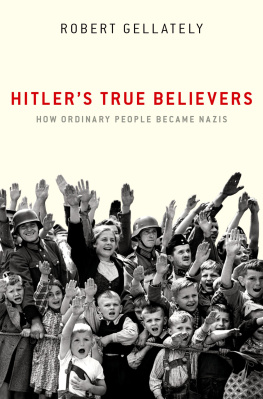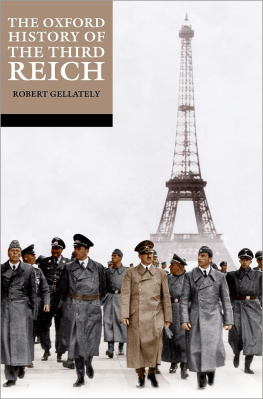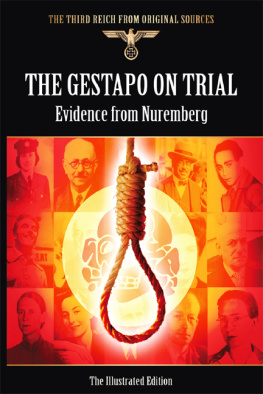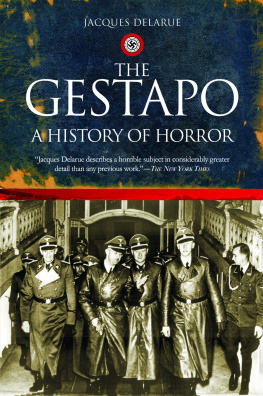ROBERT GELLATELY






THIS book began to take shape one day several years ago in the Wiirzburg state archives. After reading through a number of Gestapo (secret state police) case-files on the persecution of the Jews, I began to wonder how it was possible for the Gestapo to detect the smallest signs of non-compliance with Nazi doctrines, especially when the suspected `crime' pertained to the most private spheres of social, family, and sexual life. The files were far from clear on that point, and often said nothing about why an investigation began. How could the police have been able to enforce policies with such scrupulousness and apparent ease? Although a great deal was already known to historians about the nature of the policies, their ideological inspiration, and the contributions of leading Nazis, little had been written about the process by which these doctrines had been transformed into reality inside Germany.
At the time many Germans believed that there was a Gestapo agent on every street corner. Nor was this belief limited to the Nazi era, but has continued, to a greater or lesser extent, to shape perceptions both inside and outside present-day Germany about the Nazi police state and terroristic regime which was eminently capable of enforcing the dictatorship's will. According to this kind of logic, the structure of everyday life was so overshadowed by the physical presence of the secret police, one operating beyond the reach of conventional civil and legal justice, that the most innocuous forms of disobedience could be placed under surveillance and control, politicized, characterized as opposition, and therefore criminalized. An extensive police force, which could perhaps call on an army of agents and spies, would ensure that disobedience could readily be spotted and that popular compliance with and accommodation to the dictates of the regime would follow. Put another way, in such a police state there would have been few, if any, relatively secure social enclaves in which any real resistance or opposition could have crystallized. We have been telling each other this story, in its several variants, for over fifty years. It is no longer convincing.
In many respects I am surprised that this book turned out to deal so much with the police. As with most social historians, my inclination has been to avoid discussion of the police or the state administration. I was interested in the Gestapo case-files as sources of information about popular responses to various Nazi measures, especially the anti-Semitic ones, and hitherto I had only a secondary interest in histories of the Gestapo or the SS. As I read the Gestapo files I was convinced that the material contained in them was extremely important, but I also soon came to see that I could make sense of it only by extending the investigation to include social-historical, organizational, and even personnel issues of the Gestapo itself. As I presented the results of my research at various gatherings of specialists, my impression was reinforced that much less was known about the everyday workings of the police than might be supposed. Given that my intention in writing this book was to appeal not only to such specialists, but to a wider readership, I felt it was essential to show just how the police apparatus emerged, how it was organized and operated on a routine basis. Instead of writing a book on the German people's reactions to Nazi anti-Semitism, which was my original intention, I ended up examining how racial policy was enforced.
Specialists on the German police and the Gestapo may wish to skip over the first two chapters, although I have tried to show how the Gestapo emerged and was related to German society in ways that are not always made clear in the literature. I have also raised several issues that should interest them, such as the extent to which the political police from the days of the Weimar Republic was 'purged'.
Geographically, the book focuses primarily upon the city of Wurzburg and the district of Lower Franconia in Bavaria. I have tried to justify the `German society' in the book's title by looking at both similar and different districts elsewhere in the country, and this book is certainly not intended to have only local or regional implications.
Just as I was beginning my research, the Institute for Contemporary History in Munich, in co-operation with Bavarian archives, inaugurated the 'Bavarian Project'. While I was not part of that project, I benefited immensely from it, and especially from the information offered to me by several persons associated with it. My sincere thanks to Martin Broszat, director of the Institute, as well as Falk Wiesemann and Anton Grossmann. Elke Frohlich offered especially valuable advice. Ian Kershaw, a non-German participant in the project, has encouraged my work from the outset, and I am happy to record my gratitude. I would like to make special mention of the late Reinhard Mann (1948-81), whose work on the Gestapo remained unfinished on his untimely death. This book owes a great deal to his research findings.
It would be impossible to name all those archivists who helped me, but I would like to make special mention of several. Dr Hermann Rumschottel pointed out where I could find important materials not only in Munich, but in other archives in Bavaria as well. In the Wiirzburg archive I received the kindest co-operation from Dr Siegfried Wenisch. His colleagues in the readingroom responded with good cheer (most of the time) to my repeated requests for more and more files. They never made me feel guilty about my Aktenhunger, and I thank them for indulging what Dominick LaCapra would call my archival fetishism. In the Dusseldorf archive I was warmly received by Dr Anselm Faust, who assisted my work. At the federal archives in Koblenz Dr Wilhelm Lenz has provided both help and encouragement, and his friendship and hospitality over the years make me look forward to a return visit to Koblenz.
Some of the material in Chapters 2 and 5 is also dealt with in an article 'The Gestapo and German Society: Political Denunciation in the Gestapo Case Files', which has been published in the Journal of Modern History (December 1988). Mary Van Steenberg, the managing editor of the journal, offered numerous suggestions for improving that piece and I want to record my gratitude here. One of the anonymous readers of the article asked several challenging questions. He turned out to be Gerald Feldman, and without wishing to hold him responsible for the views expressed in this book, I want to thank him for an especially probing analysis of the paper. The book's organization was influenced by his comments and queries.
At various times and places I have profited from discussions with colleagues. I owe thanks to Sarah Gordon for pointing out the importance of Gestapo case-files as social-historical sources, and for discussions at the very earliest stages of this project. As it has turned out, I have emphasized different themes and reached different conclusions, but I am sure we share common concerns about the history of racial persecution. I am grateful to my friend and colleague Gary Owens, who never failed to lend me a sympathetic ear as I struggled to find direction for this book. Lawrence Stokes of Dalhousie University has helped me from start to finish, and has been a constant source of information. Michael Kater of York University offered both criticism and encouragement on several occasions, and I certainly benefited from both. I am deeply indebted to Marie Fleming. I like to think my prose offered her a chance to hone her considerable abilities for spotting sloppy logic and dubious reasoning. She got plenty of practice in reading through the manuscript, and has saved me from countless infelicities.























